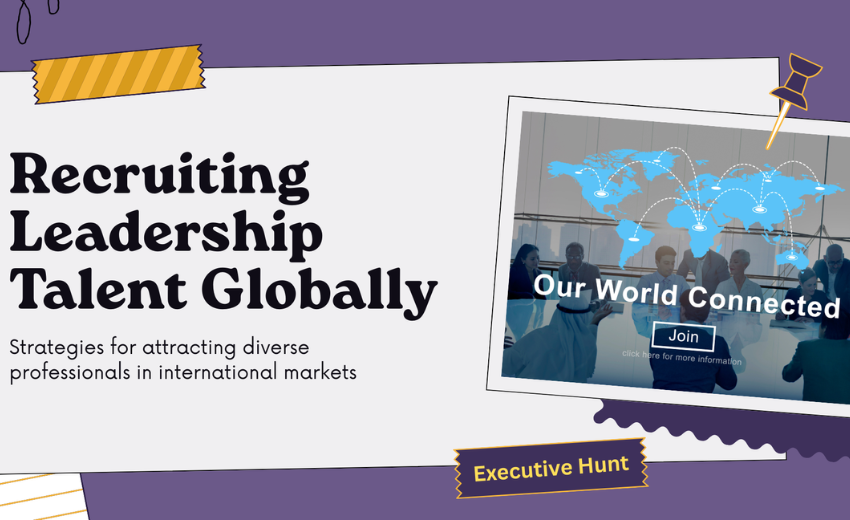In today’s interconnected world, leadership is no longer confined to local markets. Globalization, digital transformation, and the expansion of multinational corporations have created a pressing demand for leaders who can navigate complex, international environments. Companies must look beyond their borders to recruit leadership talent that can thrive in diverse markets, adapt to cultural differences, and drive organizational growth on a global scale.
Recruiting leadership talent in global markets is a sophisticated process that goes far beyond traditional hiring. It requires a blend of cultural intelligence, strategic insight, and advanced recruitment techniques. Let’s explore the essential strategies for success.
The Growing Importance of Global Leadership
Organizations expanding into international markets face unique challenges. Diverse regulations, economic instability, cultural nuances, and competitive environments demand leaders who are agile and globally minded.
Global leadership talent is not just about experience. It requires vision, adaptability, and the ability to manage diverse teams across geographies. Leaders who can unify cultures and create strategies that resonate globally are vital for long-term success.
Challenges in Recruiting Global Leadership Talent
Recruiting leadership talent across borders presents several obstacles:
- Cultural Differences – Misunderstanding cultural values can create leadership mismatches.
- Regulatory Barriers – Employment laws and visa restrictions complicate international recruitment.
- Competition for Talent – Top executives are in high demand and often difficult to persuade.
- Retention Risks – Global hires may face challenges integrating into unfamiliar environments.
- High Stakes – A failed global leadership hire can be costly and damaging to international strategy.
Because of these challenges, many companies partner with executive search firms that specialize in international recruitment.
Key Strategies for Recruiting Leadership Talent in Global Markets
1. Define Leadership Needs Globally, Not Locally
Organizations must align their leadership requirements with international goals. Instead of focusing solely on technical skills, companies should prioritize adaptability, cultural intelligence, and the ability to lead diverse teams.
For example, a leader in Europe may require different competencies than one in Asia or the Middle East. Defining leadership needs globally ensures that candidates align with broader organizational objectives.
2. Leverage Executive Search Firms
Executive search firms are critical partners in global recruitment. They provide access to international networks, identify hidden talent, and ensure discretion throughout the hiring process.
These firms specialize in sourcing leaders who may not be actively job-hunting but have the right experience and vision. Their expertise in cross-cultural evaluation also reduces the risk of mismatched hires.
3. Focus on Cross-Cultural Competence
One of the most important qualities in global leadership is cultural intelligence (CQ). A successful global leader must:
- Adapt to diverse cultural norms.
- Communicate effectively across languages and traditions.
- Build trust and cohesion in multicultural teams.
Recruiters should assess cultural competence through interviews, psychometric testing, and scenario-based evaluations.
4. Use Data-Driven Talent Mapping
Data analytics can help organizations identify leadership gaps, market availability, and compensation trends across regions. By mapping global talent pools, recruiters can strategically target executives who meet organizational needs.
For example, analytics may reveal a strong pool of digital transformation leaders in Asia or sustainability-focused executives in Europe. This insight enables targeted recruitment efforts.
5. Build Employer Brand Globally
In global recruitment, reputation matters. Top executives are attracted to organizations with a strong employer brand that emphasizes innovation, diversity, sustainability, and purpose.
Companies must showcase their global vision through thought leadership, international recognition, and transparent values. A strong employer brand makes it easier to attract top leadership talent worldwide.
6. Balance Standardization and Localization
While organizations should maintain consistent global values, recruitment strategies must adapt to local contexts. For example, hiring in Japan may require a relationship-based approach, while recruitment in the U.S. may prioritize performance metrics.
Balancing global standards with localized methods ensures recruitment processes are both effective and respectful of cultural norms.
7. Prioritize Diversity and Inclusion
Diverse leadership teams outperform homogeneous ones in innovation and financial results. Recruiting leadership talent in global markets is an opportunity to build inclusive teams that reflect different perspectives.
Headhunters and recruiters should prioritize diversity by expanding candidate pools and removing unconscious bias from the selection process.
8. Offer Competitive, Flexible Packages
Compensation is a critical factor in global hiring. Executives may expect packages that include relocation support, international school options, or flexible working arrangements.
Organizations that provide tailored benefits are more likely to attract and retain top global talent.
9. Support Integration and Retention
Recruiting the right leader is only the beginning. Integration support is essential to ensure success. Companies should provide:
- Onboarding programs tailored to international leaders.
- Cultural assimilation training.
- Mentoring and peer networks.
- These measures increase retention rates and ensure global leaders feel supported and engaged.
Future Trends in Global Leadership Recruitment
As we move into 2025 and beyond, the nature of global leadership recruitment will continue to evolve:
- Digital Transformation Leaders – Executives skilled in AI, automation, and data analytics will dominate demand.
- Sustainable Leadership – Leaders with a focus on ESG (Environmental, Social, and Governance) will be highly sought after.
- Hybrid and Remote Leadership – Global leaders must manage distributed teams effectively in hybrid work environments.
- Geopolitical Awareness – Executives will need to navigate complex international relations and trade dynamics.
Organizations that anticipate these trends will have a competitive edge in securing global leadership talent.
Conclusion
Recruiting leadership talent in global markets is both challenging and essential. Organizations must embrace strategies that combine cultural intelligence, data-driven insights, executive search expertise, and a strong employer brand.
The most successful global leaders will be those who can unify diverse teams, navigate uncertainty, and align with international business strategies. By investing in thoughtful, strategic recruitment processes, companies can secure leaders who will not only succeed in global markets but also shape the future of their industries.
In short, leadership talent in global markets is the key to sustainable growth, innovation, and long-term success.



